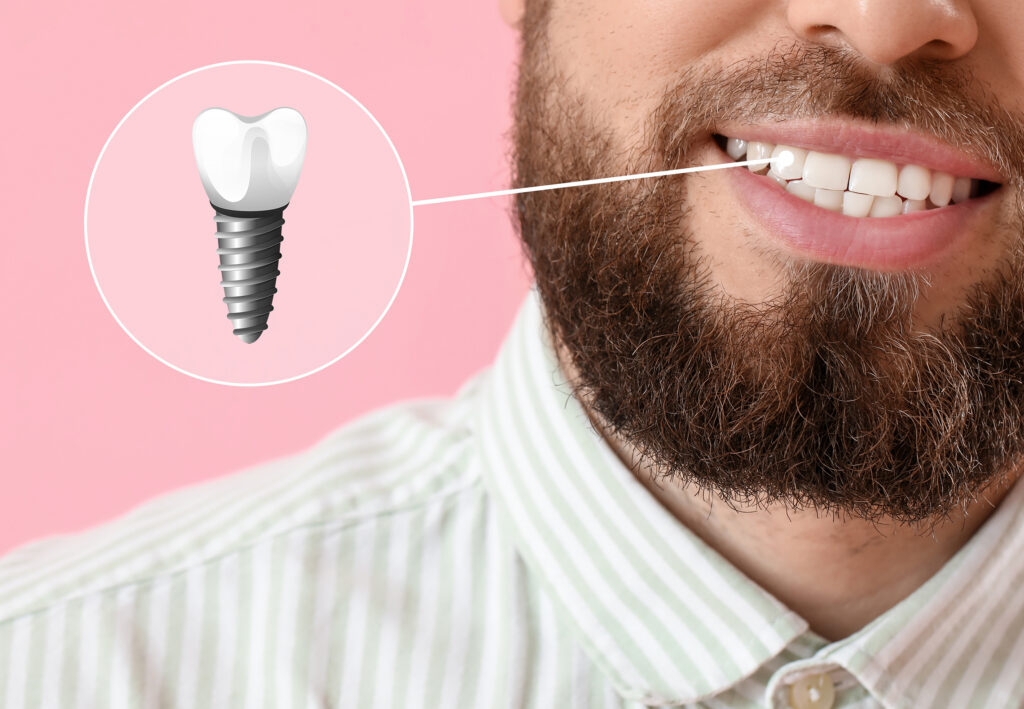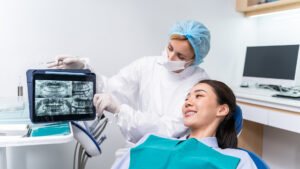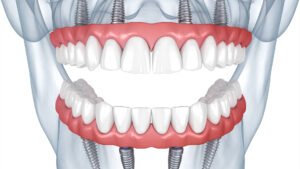Istanbul, Turkey, is the preferred place for dental implants that are being carried out to replace missing teeth or those that will be extracted for various reasons in the future. The Average Cost of Dental Implants in Turkey makes it an even more attractive option for patients seeking affordable yet high-quality treatment. Istanbul, which is the only city in the world where such natural and beautiful results can be achieved in implant procedures, is the center of attention with quality, comfortable, and smooth applications that take a short time.
Table of Contents
ToggleAnalysis of the Average Cost of Dental Implants in Turkey
Why choose a dental implant in Istanbul?
When the dental implant brands and quality are manufactured in Turkey, it serves as an opportunity for affordable families and patients with a few missing teeth. The number of dental clinics that host Istanbul dental implant centers in quality standards is quite high. The Average Cost of Dental Implants in Turkey makes it a cost-effective option for many international patients. Treatment is applied free of charge after patient arrival at the clinic, with clinics in Istanbul incorporating all the latest innovations in the world into their treatment centers.
The dental clinic in Turkey performs routine and cosmetic dentistry, teeth whitening and cleaning, and general dentistry. How much are dental implants in Turkey? The cost ratio of the patient’s treatment is determined during the appointment, and a written contract is made by the clinic and presented to the patient. Accommodation, hotel, and airport service are all included with a price guarantee.
Full mouth dental implants Turkey package deals provide significant savings for those who require multiple implants, ensuring affordability while maintaining high quality. Clinic Implant and Holident, produced in Turkey, along with Straumann and Nobel brands from Switzerland, are among the highest quality implant brands. All of these companies offer guarantees, and in the event of a problem, any material defects are resolved with a long-term warranty, reflecting their confidence in product quality (Losenická et al., 2021).
Full mouth dental implants Turkey price varies depending on the brand and procedure type. Dental implants in Turkey price is generally more affordable than in many Western countries. While Turkish-origin implant brands offer budget-friendly solutions, imported brands, particularly Swiss brands, are among the highest quality and most expensive in the world.

Average Cost of Dental Implants in Turkey: All You Need to Know
Dental facilities in Turkey provide a number of services at high worldwide standards. It is thought to be the place of choice regarding implants for those who want to spend a nice holiday and receive treatment for diseases that require long-term care. The average price of dental implants in Turkey is significantly lower compared to many European countries, making it an attractive destination for those seeking quality and affordability.
You need to be aware that Turkish dental care and hospitals provide trustworthy and knowledgeable services to people worldwide at high standards, ensuring that no health issue should be postponed for investigation (Losenická et al., 2021). As a result, many tourists come to Turkey and combine their holiday experience with dental treatment.
It is known that dental treatment attracts more tourists compared to other medical services due to the high prices in European countries. The average cost of full dental implants in Turkey is also highly competitive, offering patients a cost-effective yet high-quality alternative. With continuous advancements in the tourism sector, experienced medical staff, and modern equipment, the number of international patients choosing Turkey for treatment is expected to rise.
In Turkey, there are many places where you can receive treatment services. The most important factor to consider is whether these facilities have internationally qualified hospital staff. Additionally, for those combining treatment with travel, a well-planned travel program is arranged to enhance the overall experience.
Affordable Teeth Implants: Quality Solutions for a Brighter Smile! ✨ Click here to learn more!
The Benefits of Getting a Tooth Implant in Turkey
If a person is missing one or more teeth but is not looking for multiple implants, this is a solution for a single tooth that is almost as good as new – in this case, a dental implant. How much does it cost to have dental implants in Turkey? This is a common question among those considering high-quality yet affordable dental treatments. The dental implant can be replaced with a crown of the same material, which will be indistinguishable from a natural tooth, as it behaves in the same way.
Crowns are guaranteed for five years and are made of zirconium with high tolerance, a material that is completely bio-compatible, ensuring that no allergic reactions occur (Losenická et al., 2021). A dental implant is one of the best investments one can make for oral health. One significant reason to choose a dental implant is its longevity—when properly maintained, a dental implant can last a lifetime, whereas a traditional bridge typically lasts only seven to ten years.
Since the procedure requires waiting several months—first for the implant to “osseointegrate,” meaning the implant bonds with the jawbone, and then for the healing of the soft tissue—many patients carefully analyze the long-term benefits and costs before making a decision. Thanks to these advantages, an increasing number of so-called “dental tourists” choose Turkey as their dental destination, and Turkish dental clinics are now among the best in the world.
This is why how much does it cost to have dental implants in Turkey has become a key concern for international patients. A cost analysis at the national level shows that Turkey offers some of the most competitive prices globally. This analysis compares the long-term costs and effects of tooth replacement using dental implants versus other alternatives. To clearly present the findings, the basic information about implant therapies is explained, rough costs and expected benefits are quantified on both a yearly and lifetime basis, and the final results of the analysis are presented.
How can I pay for my dental implants in Turkey?
How Much Does It Cost for a Full Set of Dental Implants in Turkey?
- Stomatology and related surgeries in Turkey have gained significant popularity in recent years due to the availability of highly specialized dentists who offer treatments at lower costs compared to European countries.
- Many individuals who have lost most or all of their teeth opt for full jaw implants, a process commonly performed using titanium implants in the jawbone.
- How much does it cost for a full set of dental implants in Turkey? On average, the treatment costs around 10,000 Turkish Liras, whereas in European countries like the Netherlands, the price varies between €20,000 and €40,000 (Losenická et al., 2021).
- In certain regions of Istanbul, such as Fulya and Nişantaşı, full dental implants can cost as low as 5,000 Turkish Liras, making Turkey a cost-effective option.
- The package usually includes five titanium implants and an artificial tooth, ensuring long-term durability.
- Crowns placed over the implants come with a lifetime guarantee, ensuring their longevity and high quality.
best place in turkey for dental implants! ✨ Click here to learn more!
How Much Does It Cost to Get Full Dental Implants in Turkey?
- Dental implants have been developed and widely applied since the 1960s, with Turkey being a leading provider of these procedures at affordable rates.
- How much does it cost to get full dental implants in Turkey? The price varies depending on the number of implants, the materials used, and the clinic’s expertise.
- Implant-supported prostheses provide a long-term alternative to traditional dentures and are more cost-effective in Turkey than in many Western countries.
- While the process of implant placement and osseointegration (bone fusion) can take between 3 to 6 months, standard prosthetic solutions can be completed within a week.
- The three-unit fixed dental prosthesis is a preferred option in some cases, where a prosthetic bridge replaces multiple missing teeth.
- Advanced dental implant bridges, including Jampton (Cantilever) Bridges, are used to improve durability and minimize complications.
- Despite their affordability, some dental implant failures occur in Turkey due to inexperienced practitioners, emphasizing the need to choose internationally certified clinics.
Implants vs. bridging of teeth : Which lasts longer? ✨ Click here to learn more!
How Much Are Full Dental Implants in Turkey?
- The increasing demand for full dental implants has made Turkey a top choice for international dental tourism.
- How much are full dental implants in Turkey? The cost depends on various factors, including implant material, brand, and clinic reputation.
- Compared to other countries, Turkish clinics offer comprehensive dental implant packages, covering consultation, surgery, prosthesis, and follow-up care at a much lower price.
- The long-term success of dental implants depends on proper diagnosis, experienced professionals, and high-quality implant materials.
- Turkey’s dental sector continues to grow, attracting patients from Europe, North America, and the Middle East who seek high-quality yet affordable implant solutions.
- As per the World Health Organization (WHO), good dental hygiene plays a crucial role in overall health, and implants offer a functional and aesthetic solution for missing teeth.
Tooth Implant Turkey Price vs America
In the USA, a molar implant ranges from $69.00 to $6,400.00. The two most common dental insurance types in the USA are PPO and HMO, with national average fees of $1,852.00 for PPO and $1,283.00 for HMO plans. The actual average cost of a dental implant in America is approximately $3,316.00.
Meanwhile, in Turkey, the cost of a tooth implant approximates $530, making it a highly cost-effective option for international patients. Dental implants in Turkey price is significantly lower than in Western countries, which is why thousands of patients travel to Turkey for high-quality yet affordable dental treatments.
Home to over 200 clinics specializing in dental implants, the Turkish province of Antalya has built a global reputation thanks to its state-of-the-art medical centers and economical prices. Every year, over 22,000 foreign patients visit Antalya for full-mouth restoration procedures, benefiting from both cost savings and high-quality dental care.
The main direct costs of dental implant procedures include:
- Medical procedures for dental treatment
- Dental laboratory expenses
- X-ray examinations
- Fixed costs such as operation of dental surgery and rent
- Material costs including dental technology, disinfection, medication, and other supplies
In the Czech Republic, the largest direct medical costs in dentistry are attributed to operational expenses, while in Turkey, competitive pricing makes implant procedures more accessible. The cost structure of dental implants in Turkey follows similar data collection methods to studies conducted in England, ensuring transparency and affordability for international patients.
Are dental implant clear choice? ✨ Click here to learn more!
How to care for your new Dental Implants
Once you have completed your dental implant treatment, instructions for care at home may be provided separately or as directions for proper care. The cost of tooth implants in Turkey is significantly lower than in many Western countries, making it an attractive option for international patients seeking high-quality yet affordable dental solutions.
The maintenance of lacking teeth in the esophagus region of the upper and lower bone structures using metalloceramic dental implants is aimed to be studied, evaluated, and statistically estimated. Dental implant surgery is an excellent option for those who need a permanent and long-lasting replacement for missing teeth, whether due to extraction, trauma, or other causes.
The current approach to replacing missing teeth in edentulous regions is based on providing prosthetic structures—either removable or fixed—that are designed to restore function and aesthetics while being supported by oral structures like soft and hard tissues. Dental implants serve as artificial tooth roots, and they are among the most widely used treatments for tooth loss.
Three primary materials are used for the production of dental implants:
- Zirconia
- Polymeric materials
- Titanium-based implants
The cost of tooth implants in Turkey depends on various factors, including the implant material, procedure type, and clinic reputation. The lower the Young’s modulus (E) of the implant material, the closer it mimics natural bone stress and deformation distribution within the implant-bone structure. A key concern in implant procedures is bone loss in the upper jaw due to the stress shielding effect, which has clinical significance.
The aim of initial bone healing around the implanted root is to ensure controlled osseointegration, preventing fibrous bone formation and ensuring implant stability. This is critical for the long-term success of implant-based restorations.
A long-term study comparing crestal bone levels around pre- and post-loaded immediate endoosseous implants found that:
- The average bone level of all implants was significantly higher at all time points compared to baseline measurements taken four months after placement.
- There was no significant difference in the average bone level between the control and test implants at baseline and throughout the study.
- Follow-up evaluations at 2, 6, and 11 years post-implantation confirmed the long-term stability of properly placed implants.
With Turkey’s growing reputation in dental tourism, patients continue to seek treatment for high-quality dental implants at competitive prices.
best place in turkey for dental implants ✨ Click here to learn more!
How long do dental implants take in Turkey & the Average Cost of Dental Implants in Turkey?
How long do dental implants take in Turkey? What is the Average Cost of Dental Implants in Turkey? And also, how much is full teeth implants Turkey with high quality in 2022? The following illustration provides insights into 4 units, 6 units, and 8 units of dental implants, including false teeth mounted on 4, 6, or 8 implants in the upper and lower jaws.
This field of dentistry in Turkey is significantly more affordable, with the cost of dental implants being approximately 80% lower compared to European countries. Meanwhile, Istanbul is currently one of the top medical tourism destinations for Europe, the Middle East, and Asia. As a result, many Southern European patients, including those from Italy, Germany, Nordic countries, the United Kingdom, and Belgium, are increasingly traveling to Turkey for teeth replacement with implants (Byakodi et al., 2017).
When considering dental implant Turkey, patients often choose clinics in Istanbul due to their competitive pricing and high-quality implanted teeth. Below are price examples, based on a fixed conversion rate of 23 Turkish Lira per Euro or 18 TL per US Dollar. While it is possible to find slightly cheaper options in lower-reputation clinics, thorough research is essential. Patients should ensure that the package includes transfers from hotels/Airbnb to the clinic, accommodation, and airport transfers, making sure to compare apples to apples when reviewing quotes (Shoshi et al., 2014).
bridging of teeth ✨ Click here to learn more!
What Does the Dental Implant Turkey Treatment Include?
- First examination
- 2D panoramic X-ray
- FN Overhead Control
- First-stage implants
- Second-stage implants
- All necessary anesthesia and anesthetic control
- High-quality, certified dental implants
- Hospital discharge after the completion of treatment
- Three transportation services between hotel and clinic in Istanbul
By carefully choosing a reputable clinic and comparing detailed quotes, patients can benefit from Affordable Teeth Implants while receiving high-quality and cost-effective dental implant procedures in Turkey. For the best place in Turkey for dental implants, it’s essential to select a clinic with experienced professionals, modern technology, and a proven track record of successful treatments.
How long does it take to get dental implants in Turkey?
Conventional Dental Implant treatment in Turkey takes from 3 months to 1 year. The first phase normally takes 8 to 10 days and second phase takes 7 days. However, when the patients jawbone is suitable, it is possible to finish the first phase of the treatment in a single visit of 24 hours.
How long do dental implants last?
Dental implants are designed to be a long-term solution for missing teeth. With proper care, most dental implants can last up to 20 years with studies showing that they may last even longer. Now, I do not take that lightly when I say to my patients that they last that long.
How do you get implants when you can't afford it?
To help patients with and without insurance, most dentists will offer in-house financing for dental implants. All you have to do is ask. You can also cover the cost of dental implants with 3rd party, no-interest financing companies like Lending Club and Care Credit.
Is there a downside to dental implants?
The risks and complications you are taking for dental implants include infection, damage to other teeth, delayed bone healing, nerve damage, prolonged bleeding, jaw fractures and more. If you are willing to take these risks, dental implants might be right for you.
Can I get dental implants if I have no teeth?
Kristal Clinic offers dental implants to patients with a severe medical need – even though missing teeth is a problem, this alone is not enough to get you approved for the treatment. Many people who would like NHS implants are not eligible and are forced to settle for non-permanent treatments such as bridgework or dentures.
N Kıyık, S Yılmaz, M Ateş – Selçuk Sağlık Dergisi, 2023 – dergipark.org.tr. Reasons For Preferring The Private Sector in Oral And Dental Health Services: An Example From A Private Clinic in Istanbul. dergipark.org.tr
E Somay, B Yılmaz, E Topkan, B Pehlivan… – Exon …, 2023 – exonpublications.com. Radiotherapy and Dental Implant Applications in Patients with Head and Neck Cancer. exonpublications.com
Cited by 5
KÖ Tanır, C Avağ, E Tosun… – Journal of …, 2023 – Wiley Online Library. Evaluation of the quality of life and the satisfaction level after reconstruction with anterior iliac crest graft and implant‐supported fixed prosthesis treatment. biruni.edu.tr
Cited by 1
MB Bingul, M Gul, S Dundar, A Bozoglan… – Drug Design …, 2024 – Taylor & Francis. Effects of the Application Local Zoledronic Acid On Different Dental Implants in Rats On Osseointegration. tandfonline.com


